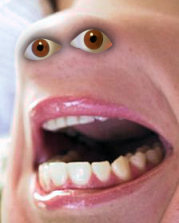© 2006 All Rights Reserved. Do not distribute or repurpose this work without written permission from the copyright holder(s).
Printed from https://danginteresting.com/retired/no-more-cavities/
This article is marked as 'retired'. The information here may be out of date, incomplete, and/or incorrect.

The typical human mouth contains a writhing orgy of bacteria. Most of these microscopic organisms are benign, and some are even beneficial, but one particular variety is a conspicuous troublemaker: Streptococcus mutans. These ubiquitous bacteria thrive on sugars in the mouth, which they consume while excreting lactic acid. This acid is responsible for the great majority of tooth decay in humankind because it erodes the enamel and dentin of the teeth.
A Florida-based company called Oragenics may have found a way to rid our mouths of these acid-excreting organisms for good. This would make cavities a thing of the past, and put no small number of dentists out of business. But despite the obvious benefits, there is potential for disaster.
Oragenics’ approach to stopping tooth decay is straightforward: they have used recombinant DNA technology to produce a new variety of S. mutans which does not excrete lactic acid. Instead, it excretes tiny amounts of an agent called Mutacin 1140 which is deadly to other strains of S. mutans, giving these new bacteria an edge over the existing organisms. Once the modified bacteria get a toehold in the mouth, the existing population of S. mutans will be methodically wiped out, leaving the non-acid-producing bacteria in its place. In the absence of acid-producing bacteria, the teeth have little to fear. Oragenics calls this new treatment Replacement Therapy.
If approved as a treatment, a single visit to the dentist would be all that is necessary. The patient’s teeth would be swabbed with the modified bacteria for five minutes, allowing it to begin its work. Over the following months, the entire population of the unmodified S. mutans in the mouth would be completely supplanted. The new organisms’ ability to muscle out the old riffraff should theoretically allow the new bacteria to reside indefinitely once it is established in the mouth— so it is possible that a single treatment will last for an individual’s lifetime.
On the surface it seems like an elegant solution, but clearly there is the potential to upset delicate systems in nature, resulting in possible larger-scale side effects. If S. mutans is present in the ecosystem outside of mouths, there is a chance that the artificial strains might be accidentally introduced into those systems, possibly destroying the natural strains. The acidity in those environments might then be drastically reduced, resulting in unpredictable and irreversible changes. This is a risk shared with many genetically modified organisms.

After extensive laboratory testing and animal trials with no observed side-effects, Oragenics has begun some early human trials. The first strains tested on humans have been deliberately crippled to require a daily “feeding” of a particular amino acid in order to survive. Using this method, researchers are confident that any of the bacteria which escape into the wild will not long survive. Also, the first people to be infected with the improved strain are denture wearers, which allows the subjects to remove their teeth at any time in case of trouble. The spouses of the subjects are also cooperating with the study, so researchers can reinforce their confidence that the bacteria is not horizontally transmissible, such as through kissing.
There is no doubt that eliminating cavities from humankind would improve our quality of life. But in a complex system such as the environment it is impossible to predict what will happen when a tiny segment of the ecosystem is replaced. Hopefully further research will provide a reliable ability to determine whether such concerns are valid, or whether they are merely the offspring of technology-stifling fear of the new and unfamiliar.
© 2006 All Rights Reserved. Do not distribute or repurpose this work without written permission from the copyright holder(s).
Printed from https://danginteresting.com/retired/no-more-cavities/
Since you enjoyed our work enough to print it out, and read it clear to the end, would you consider donating a few dollars at https://danginteresting.com/donate ?